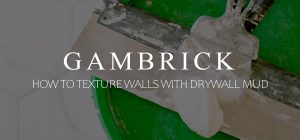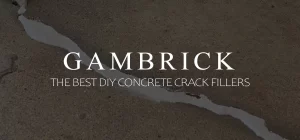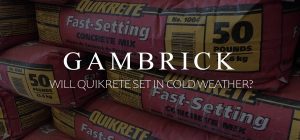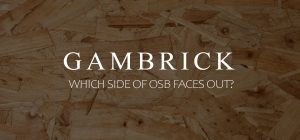What Causes Rust Stains On Concrete?
Almost everything we build uses concrete as a foundation. Residential homes, commercial buildings, bridges and even huge dams are built on concrete footings, usually with concrete foundation walls or piers. Concrete is extremely strong, durable, resistant to the elements, easy to work with, and fairly cheap. But for concrete to perform at it’s best it needs reinforcing steel rebar to provide strength, flexibility, and crack resistance. Inside all that concrete is a skeleton built out of steel. And that steel can rust. If cracks in the concrete form, air and water can work there way to the rebar and rust it. This rust can eventually travel up to the surface and leave a stain. This is the most common cause of rust stains on concrete.
Even though exposed rebar is the most common cause of rust stained concrete, any type of rustable metal used in or around concrete can potentially leave stains. Rust stains appear on concrete due to deposits of iron and water. When it rains, iron from soft rocks within the concrete, fertilizers, or metal can all cause rust spots.
I’ve been a mason for over 25years and can tell you firsthand how important it is to understand what causes rust stains.
Tools like a Sawzall can cut concrete with the right blade, but not if there’s metal inside. But many times you can figure out where the metal is by looking for rust. Once you find it, it’s usually easy to map out how the metal runs throughout the slab.
To avoid rust, only use rust resistant metal on or near your concrete when installing anchors or doing DIY project like installing a gate to concrete. Galvonized and stainless steel are my favorite materials because they won’t rust.
What Causes Concrete Rust Spots
Concrete is made by mixing sand, stone aggregate and cement with water. On it’s own concrete doesn’t typically rust because it doesn’t contain any metal. That’s why the leading cause of rust spots are caused by metal rebar or other types of metal used in or around the concrete.
Sometimes the materials used to make concrete can contain metallic minerals, which can cause rust spots, but these small spots are different than stains.
Iron, magnesium, copper, and zinc are the main mineral causes of concrete rust spots. It’s rare for minerals to cause rust stains, but it happens from time to time.
When metal interacts with water, the chemical reaction can cause rust stains and spots. Concrete with lots of iron and other metallic minerals can cause dark orange spots on your sidewalk, patio, steps or porch when they get wet.
Rust can lead to cracks in the concrete if it gets bad enough. If your slab starts to crack, immediately fill the crack with a DIY concrete crack filler. By filling the crack, you prevent water and air from reaching the metal, which helps prevent future rusting.
Rusting Pop Outs
Have you ever seen rust those round rust spots on a driveway or concrete wall that looks like metal sticking out of the surface? They can get really dark at the center and then orange. Although this could be caused by protruding metal, it’s typically caused by iron stone or coal within the concrete.
Concrete manufactures sometimes include a small amount of these stones within their mixes because it’s mined in the same place as their other stone aggregate. It would be almost impossible to sift through and filter out every single piece. These iron and coal deposits are considered “soft rock.” Which means they can absorb more water than other types of stone.
If that stone absorbs water and swells by the edge of the slab it will pop out and then rust. The chemical reaction between the exposed rock, water and air causes it to rust until it fully degrades. Pop outs can leave ugly bleeding rust marks on a concrete slab or wall until properly removed.
Although they’re ugly, rust stains due to pop outs are not considered unacceptable by industry standards. It’s just a part of working with concrete that can’t be avoided.Here’s a few things you can do about them.
- Remove the stain with some CLR.
- Reduce the chance of soft rocks creating rust stains sealing your concrete. A sealant will keep water off the rock which prevents it from rusting.
- Remove the soft rocks from your concrete and make repairs.
Soft Rock
Cement binds concrete together by chemically reacting with water. Sand helps the mix by providing some texture and grit. But it’s the stone that gives concrete it’s strength. Without stone aggregate, cement and sand wouldn’t have enough compressive strength to support heavy structures.
Soft rocks are mined along side the stone aggregate and are hard to filter out. Because of this, there’s a chance some will be included in your mix. They’re more porous and higher in iron and other metallic minerals than other types of aggregate. Concrete suppliers are allowed a certain amount of soft rock within their batches since there’s no practical way to get all of it out.
Soft rocks tend to absorb more water than other rocks. If they’re by the edge of the concrete and swell, they can push out of the concrete becoming exposed to the weather. Once the metal comes in contact with water and air, it begins to rust.
Soft rocks will continue rusting until the rock is completely deteriorated or removed.
Fertilizer
Most fertilizers contain minerals and iron. If you fertilize potted plants, landscaping or the lawn on top of or right next to concrete, those metals can collect and rust.
The type of rust that’s caused by fertilizer looks like lots of little orange spots.
These spots won’t damage the concrete since they’re only on the surface. When you fertilize near concrete, remember to sweep before it rain or gets humid to prevent the minerals from rusting. It doesn’t take long to happen. The metals found in fertilizer can start rusting in a day once exposed to moisture and water.
Luckily these little concrete rust stains are easy to clean off and rarely make any permanent marks. However, if some of the fertilizer seeps into the concrete’s pores and cracks and then rusts, the rust can be much harder to clean.
Rusty Steel Rebar
Concrete has an extremely high level of compressive strength. This is it’s ability to support large amounts of weight without cracking and the main reason it’s such a great building material. But it’s weak when it comes to tensile strength. Which is the ability to resist pulling stress. If a concrete beam is evenly supported by the ground, it can withstand a lot of pressure. However, if that same beam is only supported at both ends with no support in the middle, it will crack when under very little stress. This is why steel rebar is used.
Rebar is a reinforcement for concrete. It forms a steel skeleton which drastically increases the concrete’s tensile strength. Because of rebar, we can build almost anything out of concrete. It’s safe to say that almost every home, building and large industrial structure has some rebar in it. But for all it’s benefits, steel rebar easily rusts.
Rebar is buried deep inside the concrete and away from the edges so it normally doesn’t rust. But if cracks in the concrete occur and water can reach the rebar it will eventually rust. This is made even worse when salt is added to the mix. Common road salt is bad for concrete, increases cracking and speeds up rusting.
When steel corrodes it creates iron oxide that expands inside the concrete. This expansion generates stress, often called oxide jacking, which can damage the concrete. The cracks enlarge and the rust gets worse.
The most common cause of rust stains on concrete we see are due to cracks and rusted rebar. The rust works it’s way up the cracks and to the surface.
Metal
Almost every type of metal can rust. Especially if they contain iron. That’s why exterior metal that’s exposed to the elements needs to be protected with some sort of resistant coating. Even rebar is offered with an epoxy coating just in case the concrete cracks. Although it isn’t used much because of it’s high cost.
Fences, posts, brackets, bolts, hangers, etc. If you’ve got exterior metal in contact with or penetrating into the concrete, it can cause rust stains.
Even when metal is coated, that coating can eventually chip, crack or become damaged. Once the outer protective shell is remove even slightly, the inner metal can rust. This is basically the same way rebar rusts inside concrete. Concrete acts as the protective sheath for rebar. So when it’s removed there’s nothing left to prevent rusting.
Another cause in some places is iron rich soil. This can cause rust spots similar to fertilizer. Basically anything containing iron can leave rust stains on concrete because iron is very susceptible to rusting.
How To Prevent Rust Spots
The best way to prevent rust spots is to seal and repair your concrete. A sealant is a protective barrier between your concrete and the elements. If water can’t penetrate into the concrete then it can’t get to the rebar. Also make sure to caulk or repair any large cracks. And keep exposed metal coated. This is why outdoor metal is generally painted. Paint acts as the metal’s sealant.
Sealants penetrate deep into the concrete’s pores and small hairline cracks. Bigger cracks should be filled with caulk or repaired.
Thicker coatings can also be applied to concrete depending on it’s use. Garage floors or driveways are often covered with floor paint or a thick epoxy. You can also use masonry paints on concrete floors and walls. Coatings keep moisture, oils and other stains away from the concrete.
Be prepared to re-seal or re-paint as needed. Typically this is required every year for a sealer. Paint will vary based on the type you use but generally it’s every 3-5 years.
Here are a few other ways you can keep rust stains off concrete.
- Sweep off the concrete of any soil or fertilizer.
- Remove metal objects that are not coated.
- Apply a protective coating to metal furniture or decorations.
- Remove and repair or seal pops if you find them.
Remove and Repair Rust Spots
Getting rid of most common concrete rust spots can be as easy as a simple scrub. There are lots of rust cleaners on the market specifically designed to remove rust stains from concrete. There are also companies that will come out and do it for you. Typically they have stronger cleaners than you can buy at the store. However most strong cleaners involve harsh chemicals.
I like to keep my cleaners to a minimum and use natural solutions like warm soap, water and a power washer. These methods are generally good enough to take out surface rust stains. However, if the stains get deep into the concrete’s pores, simple cleaners usually don’t work.
Before you begin cleaning, remove any hard flaking rust. This will help reveal the root cause of the rust so it can be fixed. While cleaning will make the concrete look better, they won’t prevent future rust stains unless you deal with the cause.
Remove pops if you find them. clean the void and then fill them with new concrete.
If rusty metal is penetrating into the concrete, it will have to be removed and repaired/replaced too. You’ll also have to repair the concrete.
Rust stains that won’t come out can always be covered up with paint or an epoxy coat. Just make sure to clean them as well as you can and make necessary repairs before you paint.
It’s up to you to determine if your rust stain is just a stain or a symptom of a much bigger problem.
Chemical Cleaners
For tough stains that won’t come out with simple soap and water, try a chemical cleaner. They’re stronger than soap and can get out deeper stains.
Be careful when handling or using chemical cleaners. They’re typically toxic, harmful to the skin and eyes, and shouldn’t be breathed in. Read the directions and follow all safety instructions. Wear gloves, safety goggles and do your work outdoors or in a well ventilated area. You may also want to wear a mask.
Cleaners containing trisodium phosphate or oxalic acid are very effective at removing rust stains, but they’re toxic and should be handled with great care. Many of these chemical cleaners can also strip the concrete of its paint or stain, so be prepared to do additional work after the stains are removed.
Natural Cleaners
I always prefer to use a natural cleaner whenever I can. They’re not a strong as chemicals but they’re a lot safer.If a natural cleaner doesn’t work you can always try a chemical next.
Here’s a list of a few things you can try.
- Baking Soda
- Baking Soda & Vinegar
- Vinegar & Lemon Juice
- Soap & Warm/Hot Water
- Poultice
Let a natural cleaner soak in for 10 to 30 minutes before you do a good scrub with a hard bristled brush. For most surface level rust stains, a simple wash will clean them. But when the rust penetrates deep into the concrete’s pores it can be hard to remove.
You could also try making a home made poultice if the stain isn’t too large. We use these all the time to clean stains off marble and other soft stones. Mix baking soda with clean soapy water until it forms a thick paste. Then cover the entire stain with paste and cover it with plastic wrap. Wait about an hour and then remove the plastic and clean off the paste. A poultice is a great way to draw stains out of deep pores and sometimes works on concrete.
I recommend starting with a basic cleaning of the surface and then trying a natural remedy. If that’s not effective, buy a cleaner from a local hardware store or hire a professional.
Once the stain is removed don’t forget to repair the damage and seal the concrete to prevent future staining.
Summary: What Causes Rust Stains On Concrete?
Almost everything we build uses concrete as a foundation. Residential homes, commercial buildings, bridges and even huge dams are built on concrete footings, usually with concrete foundation walls or piers. Concrete is extremely strong, durable, resistant to the elements, easy to work with, and fairly cheap. But for concrete to perform at it’s best it needs reinforcing steel rebar to provide strength, flexibility, and crack resistance. Inside all that concrete is a skeleton built out of steel. And that steel can rust. If cracks in the concrete form, air and water can work there way to the rebar and rust it. This rust can eventually travel up to the surface and leave a stain. This is the most common cause of rust stains on concrete.
Even though exposed rebar is the most common cause of rust stained concrete, any type of rustable metal used in or around concrete can potentially leave stains. Rust stains appear on concrete due to deposits of iron and water. When it rains, iron from soft rocks within the concrete, fertilizers, or metal can all cause rust spots.
I’ve been a mason for over 25years and can tell you firsthand how important it is to understand what causes rust stains.
To avoid rust, only use rust resistant metal on or near your concrete when installing anchors or doing DIY project like installing a gate to concrete. Galvonized and stainless steel are my favorite materials because they won’t rust.
If you have any questions email or leave a link below.

John Mazzuca | About | More Posts |
Custom Home Builder
John Mazzuca is a custom home designer and builder at Gambrick with over 25 years experience in the construction industry. John has designed, built and/or remodeled hundreds of homes, small buildings, and commercial projects. He writes about business, real estate, home building, and household electronics. His work has been featured in Fox Business, Better Homes & Garden, House Beautiful, and more.





















